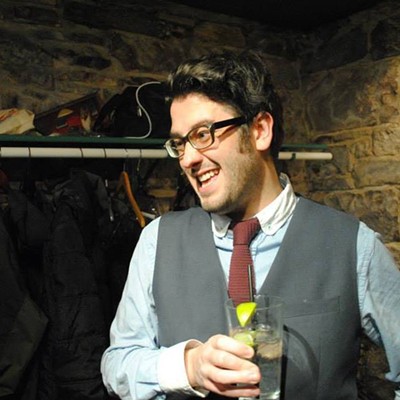Julie Golden is a novelist, political activist, stained-glass artist and hula-hoop hobbyist who lives in Boulder. She is also a woman who has triumphed over unimaginable hardships with tremendous grace and a renewed vigor for life, a woman whose compassion is evident in everything she does. Her novel Vagilantes is a twist-filled narrative that focuses on a group of women abuse survivors and the pedophiles who keep getting mysteriously murdered. We met up with Golden this week to discuss vigilante justice against pedophiles, writing like David Foster Wallace, and a brain injury that nearly took away her ability to read.
See also: Author Shannon Baker on Hopi culture, Barbara Kingsolver and fake yellow snow
Westword: The title Vagilantes makes the book seem lighthearted and tongue-in-cheek, but it prompts a very serious discussion about child abuse, revenge and right and wrong. What drove you to write this book? Was there an element of wanting to punish some of the worst offenders in society?
Julie Golden: I've had that urge to want to punish victimizers throughout my life. Honestly, though, it was more hearing voices in my head at night and getting up to write. Then I'd look it over the next day. I hadn't realized I was writing a novel, that wasn't my intention at first. I was just sort of putting these voices down. That's where it came from. I had probably been writing like that for about a year and then I had a brain injury. I lost 95 percent of my ability to read. I could read a sentence and identify and understand each single word, but I couldn't put them together and understand what it meant.
Jesus. What happened?
I was standing in a parking lot after a marathon-training session, and a car backed into me and then that car took off. It just sort of jerked me forward, didn't even knock me down. I told my friend, "I gotta go home, I'm feeling kinda shocked." Over the next few days it got worse, until eventually I couldn't read anymore. I was such a voracious reader before that, I probably read about three books a week. I was always reading something. I couldn't write, and the injury interrupted my ability to communicate vocally, too. It was odd, because I'd be speaking to somebody, like I am to you right now, and then suddenly blurt out, "Sauerkraut!"
That sounds terrifying. How long did you have to go though that?It was about ten years ago. I knew that if I didn't find a way out of that -- by then I was connected to this book, and I knew I wanted to make it a novel -- and if I didn't find my way out of this then I'd never finish the book. So I just pushed myself, I read; I read, read, read all the time even though I barely understood what I was seeing. But I just kept going. Then I connected with other people by joining writing groups, like Rocky Mountain Fiction writers, and that sort of thing.
Reading Vagilantes as well as your blog, it's evident that you are motivated by a righteous outrage at people getting away with heinous crimes. Where does that sense of justice come from?
I was the director of the ACLU in Iowa, and while I was there I did a lot of work with prisoners. In fact, I was instrumental in helping get the Womens' Prison moved to another location. But I know that there are a lot of people who get away with crimes. Child sexual abuse is something where so many people get away with it, more than can we can really ever know because children don't report those incidents. Even as they get older, they still don't want to report it. It's horribly disruptive to your life to come forward that way. That's why it takes so much bravery for people to come forward.
Aside from relating a pretty twisty and gripping narrative, one of the things Vagilantes accomplishes is that it provides an opportunity to discuss an incredibly difficult topic. Have you had a lot of response from people who've read your book and found it helpful?
Well, sure. I don't know what "a lot" would be, I wish it was millions, but I appreciate every response. That was part of my purpose. It's another way for people to to learn -- particularly privately -- and to have those discussions. Some people accomplish that through song or visual art, some people do it through counseling programs. It's just another medium. I do hope it helps the conversation. I really hope it's something that recognizes the visceral response we have when we hear a child has been abused.
Vagilantes is a difficult book to ascribe to any genre. Do you think of it as a thriller?
The concept is that these women -- without intending to -- get enmeshed in killing these pedophiles who have escaped the justice system, so there had to be that justice-system aspect of the story. I don't claim that my book goes deep into the thriller genre, because I so admire the people who can write those well. Even my publisher kind of put it in the wrong genre. We ended up with Women's Lit, which they don't even have a category for on their website. It didn't fit so easily.
How would you describe your writing style?
Oh, I don't know. I went online and took one of those "who do you write like" comparisons. Have you seen those?
Where you copy and paste a few paragraphs of your writing into their algorithm and then they make a flattering comparison to a famous writer? Yeah, I've done that. Who did it tell you you wrote like?
David Foster Wallace. Do you remember what it said about you?
That I write like H.P. Lovecraft, who is much better at storytelling than writing. I guess I use too many adjectives. Are you a fan of David Foster Wallace?
Well, I hadn't read much at that point. He wasn't popular when I was in school and I just never caught up to him. After that analysis, I started reading his books and quickly became a devotee.
So you've completed Infinite Jest?
Yes. Also Brief Interviews with Hideous Men. I feel like I might have met him in Boston. I met a younger man, a writer named David, and we chatted for hours. He had a typewriter in his room. I asked him what he wrote about and he told me, "I write about old men in dark bars" and at the time I thought that didn't sound interesting, but I was wrong.
Infinite Jest has defeated me twice, but I really like his essays. Have you read "a supposedly fun thing I'll never do again?" It's about cruise ships.
I'll look it up.
You mentioned on your blog how books provided escapism for you during a troubled childhood in an abusive home. Do you remember having any books back then that you re-read all the time or loved so much that they were...
...like my velveteen rabbit?
Yes, that's a great analogy.
No, I just read everything I could get my hands on. I was raised as a fundamentalist Christian, so my reading was very restricted. There were a lot of books about missionaries going to foreign countries.
Was C.S. Lewis permissible in that environment?
No, even that was too out there; I didn't read any of that stuff until I was older. I don't really have anything left from that time. When I was on my own, I went looking for books about people who were like me, so I'd know that I wasn't alone. Books about crazy women. You know, like the Bell Jar. Lots of romance, too. For some reason, romance magazines were around even at home. I was the editor of my high school lit anthology, and I wrote a romance story about a couple who fell in love and then died in a car crash. I didn't get to be editor because I was such a great writer, though: I was a really fast typist and nobody else wanted the job.
Fans of Julie Golden's writing can keep up with her thoughts and news updates on her blog 52 Ways to Stop Pedophiles. Visual arts fans can also head up to Boulder this Saturday and Sunday, where Golden will exhibit her stained glass artwork at Open Studios from noon to 6 p.m.
Follow Byron Graham on twitter @ByronFG for more mildly amusing sequences of words.











